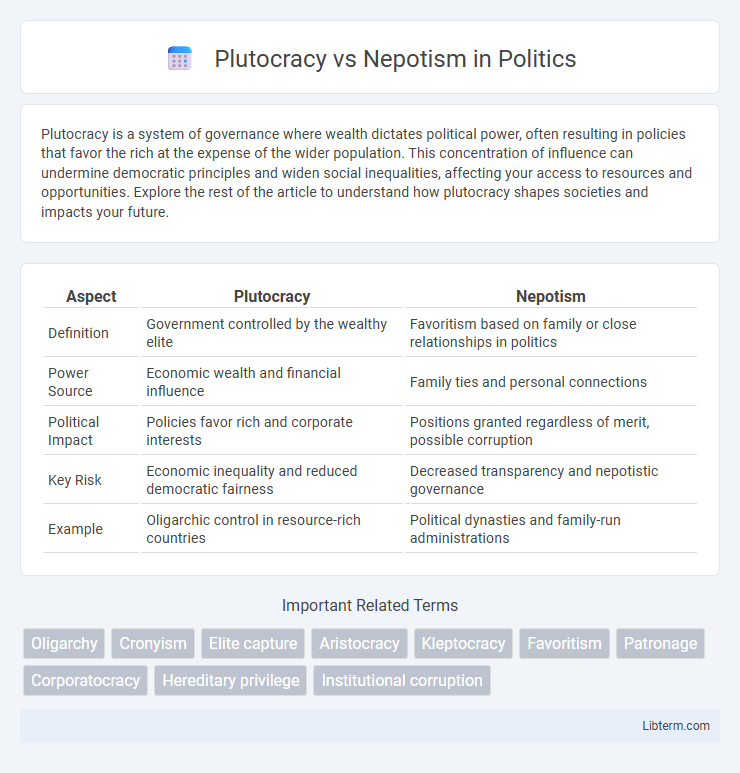Plutocracy is a system of governance where wealth dictates political power, often resulting in policies that favor the rich at the expense of the wider population. This concentration of influence can undermine democratic principles and widen social inequalities, affecting your access to resources and opportunities. Explore the rest of the article to understand how plutocracy shapes societies and impacts your future.
Table of Comparison
| Aspect | Plutocracy | Nepotism |
|---|---|---|
| Definition | Government controlled by the wealthy elite | Favoritism based on family or close relationships in politics |
| Power Source | Economic wealth and financial influence | Family ties and personal connections |
| Political Impact | Policies favor rich and corporate interests | Positions granted regardless of merit, possible corruption |
| Key Risk | Economic inequality and reduced democratic fairness | Decreased transparency and nepotistic governance |
| Example | Oligarchic control in resource-rich countries | Political dynasties and family-run administrations |
Understanding Plutocracy: Definition and Key Features
Plutocracy is a form of governance where power is concentrated in the hands of the wealthy elite, often characterized by the influence of money on political decisions and policy-making. Key features of plutocracy include economic inequality, where wealth dictates social status and political power, and the prioritization of business interests over public welfare. Unlike nepotism, which centers on favoritism towards relatives, plutocracy emphasizes the dominance of financial resources as the main driver of control and authority within a society.
What Is Nepotism? Unpacking the Concept
Nepotism refers to the practice of favoring relatives or close friends in professional settings, often through hiring or promoting them regardless of merit. This form of favoritism undermines equal opportunity and can lead to inefficiency and corruption within organizations or governments. Unlike plutocracy, which is rule by the wealthy, nepotism specifically centers on prioritizing personal relationships over qualifications and fairness.
Historical Roots of Plutocracy
Plutocracy, rooted in ancient civilizations such as Rome and Athens, emerged from wealth concentration allowing elite classes to dominate political power and decision-making. Historical examples include Venetian merchant oligarchies and early modern European aristocracies where wealth dictated governance structures. This economic dominance contrasts with nepotism, which centers on family-based favoritism rather than systematic wealth accumulation.
Nepotism in Different Cultures and Societies
Nepotism manifests uniquely across various cultures, often shaped by traditional values and societal norms that prioritize family loyalty and lineage. In collectivist societies such as those in East Asia and the Middle East, nepotism is frequently seen as a moral obligation to support relatives, reinforcing social cohesion and trust within communities. Conversely, in Western societies, nepotism is typically viewed as unethical favoritism, undermining meritocracy and prompting institutional reforms to promote fairness and transparency.
Plutocracy vs Nepotism: Core Differences
Plutocracy is a system of governance where wealth dictates political power, privileging the richest individuals or families in societal decision-making. Nepotism refers to favoritism based on familial relationships, often resulting in unqualified relatives receiving positions of influence regardless of merit. The core difference lies in plutocracy's wealth-based authority contrasted with nepotism's reliance on kinship ties for power allocation.
Overlapping Consequences in Governance
Plutocracy and nepotism both erode meritocratic principles in governance, fostering environments where power is concentrated among wealthy elites or familial networks, respectively. These overlapping consequences include diminished public trust, skewed policy-making favoring select groups, and systemic corruption that undermines democratic institutions. The entrenchment of such power structures often leads to socio-economic inequality and inhibits social mobility within the political framework.
Economic Impacts of Plutocracy and Nepotism
Plutocracy concentrates wealth and decision-making power in the hands of a few, leading to economic inequality and reduced social mobility as resources are allocated based on wealth rather than merit. Nepotism distorts labor markets and corporate governance by favoring relatives or friends over qualified candidates, resulting in inefficient allocation of talent and diminished productivity. Both systems undermine competitive markets, hinder innovation, and can perpetuate systemic economic stagnation due to mismanagement and unfair access to opportunities.
Social Mobility: Barriers Created by Both Systems
Plutocracy and nepotism both create significant barriers to social mobility by concentrating wealth and power within a select few families or individuals, limiting access to opportunities for those outside these circles. In plutocratic systems, economic inequality entrenches privilege through control of resources, while nepotism perpetuates favoritism in job placements and political appointments, undermining meritocracy. These systems restrict upward mobility by privileging inherited status over talent and hard work, resulting in persistent social stratification.
Modern Examples: Plutocracy and Nepotism in Action
Modern examples of plutocracy include countries like the United States and Russia, where wealthy elites exert significant influence over political decisions through campaign financing and lobbying. Nepotism is prominently observed in family-run corporations such as Samsung and political dynasties like the Kennedys in the U.S., where leadership and opportunities are often secured based on family ties rather than merit. Both plutocracy and nepotism undermine democratic principles by prioritizing wealth and kinship over equal representation and competence in governance.
Solutions: Combating Unfair Power Structures
Addressing plutocracy requires transparent campaign finance reforms and stricter regulations on wealth-driven political influence to ensure equitable representation. Combating nepotism involves implementing merit-based hiring practices and enforcing anti-nepotism policies across public and private sectors. Educating the public about these issues strengthens accountability and supports systemic changes that promote fairness and equal opportunity.
Plutocracy Infographic

 libterm.com
libterm.com